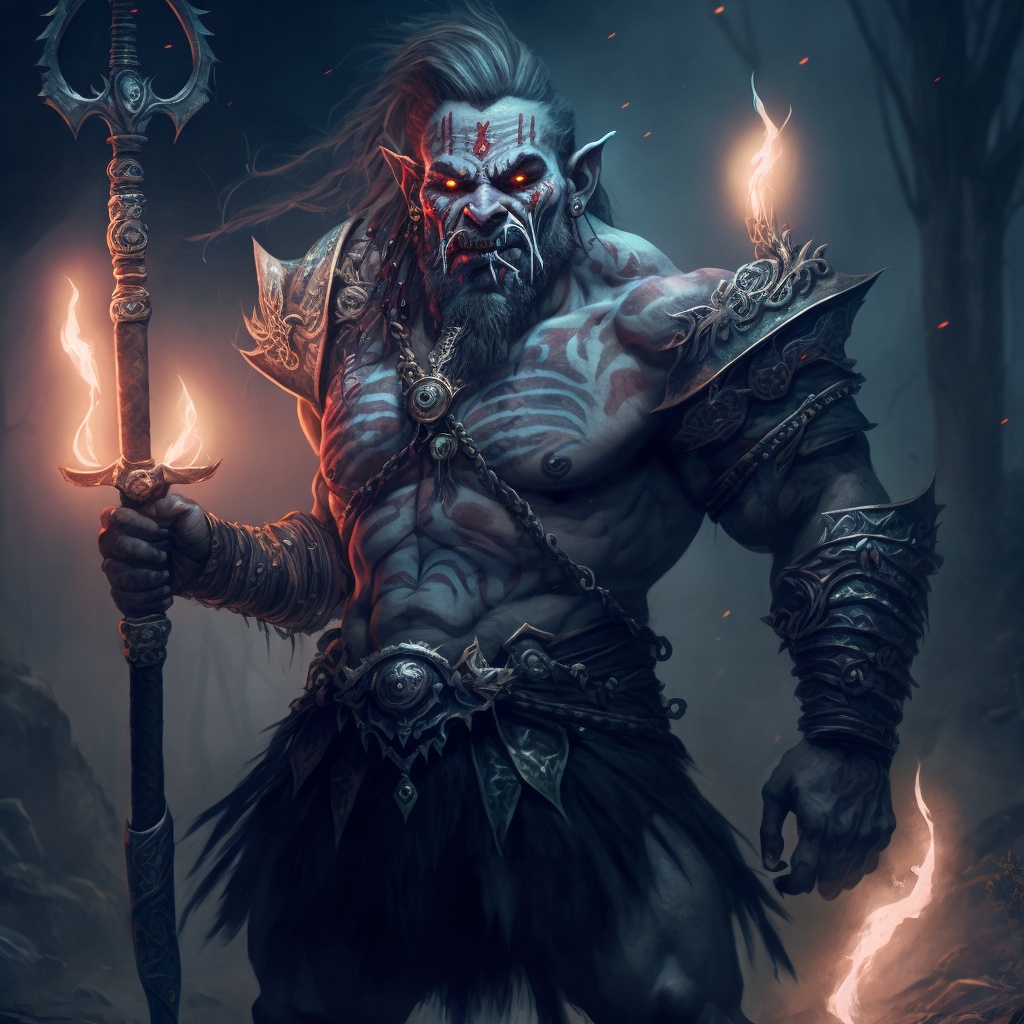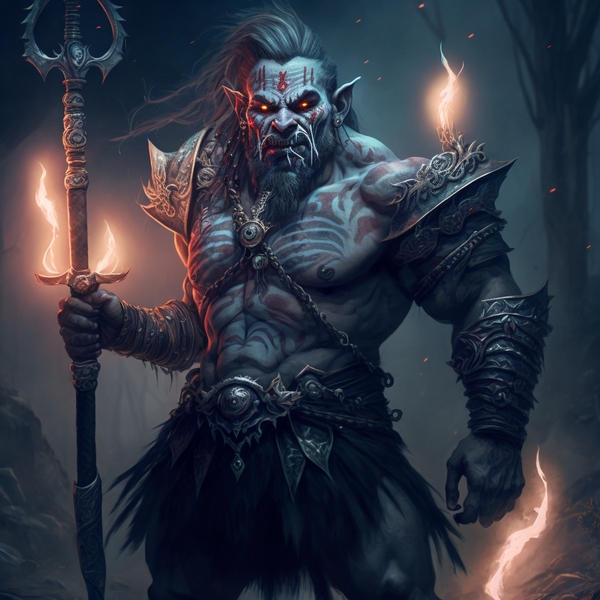

„Der erste Vater war Akhrosch. Damals, kurz nachdem Licht von Dunkelheit durch den Allvater und die Allmutter getrennt wurde, erschien er auf Tirakan. Er wurde der Ungeborene genannt denn er hatte keinen Vater und keine Mutter. Aus sich selbst und dem Lehm der Erde schuf er Kchtuh, seine Gefährtin. Gemeinsam jagten sie die damaligen Lebewesen der Erde und gebaren viele Kinder.“... von Edis Elbenfreund, Anthropologe zu Yavon, ca.300 EC
So beginnt die prosaische Bearbeitung des Liedes des Akhrosch, welche der Völkerkundler Edis Elbenfreund veröffentlichte. Da es wohl nie mehr als eine Handvoll menschlicher und elfischer (von den Zwergen und anderen Völkern Tirakans ganz zu schweigen) Gelehrter gab welche des Altorkischen mächtig waren ist diese Form die einzig greifbare des Schöpfungsmythos der Orks. Die mündlich tradierte Folklore der Schwarzpelze tut ein übriges um die Quellenlage schwierig zu gestalten. Aber durch die Ergebnisse der modernen Völkerkunde kann man einige Hypothesen aufstellen.Die Identität des Allvaters und der Allmutter ist durch die Existenz einer Priesterschaft des Rogal und der Zyral unter den Kroto'Chim durchaus festzumachen. Allerdings wird kein Ork dieses einem Nicht-Ork gegenüber bestätigen. Viel wichtiger als diese „Götterkulte“ ist aber der Ahnenkult und in diesen ist der Gott Akhrosch als erster Ork, aber auch Gott, am wichtigsten. Die Katora allerdings beschränken sich auch auf diesen neben der Verehrung von angeblich dunklen mächtigen Geistern und so wird von einigen ihrer Schamanen behauptet das die Identifikation mit den genannten 2 Titanen auf Verwirrung durch menschliche Missionare beruht.
Weitere Geschichten um Akhrosch
Am Lagerfeuer erzählen nicht nur die Schamanen sondern eigentlich alle Orks, egal welchen Stammes oder welcher Sippe, Legenden über den Ersten. So soll es Akhrosch gewesen sein der als erster die wilden Stiere der Steppe mit Muskelkraft zähmte indem er mehrere tausend Meilen mit ihm um die Wette lief und die Tiere, beeindruckt von seiner Kraft und Zähigkeit, ihn als ihren Meister akzeptierten. Des weiteren lernte er in Trance vom Geheimnis des Brauens und des Brennens und bis heute wird erzählt das kein Wesen der Welt jemals an seine Künste heranreichten. Seine Gefährtin Kchtuh soll die erste gewesen sein welche die schamanischen Gesänge der Orks sang. Denn trotz der auf den ersten Blick grobschlächtigen Statur der Orks gibt es unter ihnen sehr gute Sänger, einige davon können sogar mit 2 verschiedenen Stimmen singen.
Doch die für alle Orks wichtigste Geschichte ist die vom Kampf mit Aragni, dem großen Drachen, welcher die Steppe beherrschte. Einst sollen einige der Kinder Akhroschs von jenem Lindwurm gefangen genommen worden sein. Akhrosch war voller Gram ob dieses Geschehens und verfolgte die Spur. Am Hort des Drachen angekommen sah er das dort Diener des Drachens, heute von vielen Orks für Morgalas gehalten, diesen bewachten. Alleine, nur mit einem Speer bewaffnet ging der 3 Schritt hohe Akhrosch in die Höhlen und nachdem er 1000 Zwerge erschlug traf er auf den Drachen. Der Kampf soll gar grausam und blutig gewesen sein und nach mehreren Stunden hartem Ringen konnte der Ungeborene dem Lindwurm besiegen. Doch seine Kinder fand er bereits erdrosselt. Aus Wut schwor er ewige Rache und den meisten traditionellen Orks sitzt bis heute der Hass auf alle Morgalas tief in der Seele. Seine Tränen fielen auf die Leichen seiner Kinder. Da dies die Tränen eines Gottes waren wurden diese wie durch ein Wunder wieder lebendig. Diese Kinder wurden später auch als Stammväter der Ur-Sippen der beiden Stämme verehrt, man nennt sie wegen ihrer Wiederauferstehung auch „Die zweimal geborenen“. Ihre Namen werden niemals ausgesprochen und es heist das nur die Schamanen sie wirklich kennen und ihnen einiges der Macht geben über die sie gebieten können.
Akhroschs Rache war fürchterlich. Gemeinsam mit den stärksten seiner Söhne und Töchter töteten sie alle Morgalas welcher sie habhaft werden konnten, egal ob Mann, Weib oder Kind. Nur wenige Sippen der verfluchten Dunkelzwerge konnten durch Hilfe ihrer dunklen Göttin entkommen. Diese als „der reinigende Fluss des Blutes“ in das kollektive Bewusstsein der Orks eingebrannte Reihe an Feldzügen ist bis heute Vorbild der Mann- und Fraubarkeitswerdung vieler Orks. Denn man sollte auch bei recht zivilisiert wirkenden Sippen wie zB der Kroto'chim nicht vergessen das der Hass tief sitzt und viele junge Orks, selbst wenn sie eigentlich Bauern sind, erst als Erwachsene gelten wenn sie einen Schädel eines verfluchten Fraxut nach Hause tragen.
Akhrosch selbst ist niemals gestorben. Nach dem Tod seiner Gefährtin verlies er seine Familie und bis heute erzählen immer wieder Orks davon wie sie in gefährlichen Situationen von einem alten, riesigen Ork gerettet wurden. So wurde er auch schon von Angehörigen anderer Völker gesichtet welche aber nie wussten wer sich ihnen da entweder in den Weg stellte oder ihnen half. Doch er mischte sich nie mehr in politsche Dinge ein. Sein Königreich war und ist nicht von dieser Welt. Doch das könnte sich ändern wenn er sieht das es für seine Kinder, die er immer noch über alles liebt, ums Überleben geht.
Der Speer des Akhrosch
Die wohl mächtigste Reliquie des Akhrosch ist sein Speer. Auch nach mehreren tausend Jahren soll dieser noch keine Spuren eines etwaigen Altersprozesses zeigen. Der letzte Träger dieser heiligen Waffe war der 2köpfige Katora Marduhr, König aller Orks, der im Jahre 512EC von seinem Sohn Muhar erschlagen wurde. Doch Muhar fand den Speer nicht und wurde kurze Zeit später selber Opfer der nicht ungewöhnlichen gewalttätigen politischen Auseinandersetzungen zwischen den aberdutzenden verschiedenen Fraktionen der Orks. Der weise Nachfolger als Allkönig aller Orks, Ashnuuk, ein Kroto'Chim, soll diesen weit weg gebracht haben und es heist das erst wenn ein Ork sich als würdig erweist und die Not der Orks am größten ist, diese mächtige Waffe, welche sogar Drachen töten kann trotz ihres einfachen Aussehens, wiedergefunden wird. Dann werden alle Stämme und alle Sippen wieder gemeinsam gegen den Feind laufen, wer immer das sein will. Und dann, so erzählen zum Beispiel die scheuen Dsch´hranar, wird Akhrosch in erster Reihe stehen und seine Kinder zu Ruhm und Ehre führen.
Das Horn des Akhrosch
Dieses Artefakt wird in Mur’Kahr aufgehoben. Es ist ein Horn eines Nahrz'gu und soll der Überlieferung von Kchtuh aus dem ersten von Akhrosch erlegten Tier hergestellt worden sein. Wird in das Horn geblasen so kommt für den Nicht-Ork kein Ton heraus. Doch alle die auch nur einen Teil des Blutes des Akhrosch teilen (also auch Halborks sowie Menschen mit orkischen Vorfahren die es vor allem in Hadewald geben soll) hören über eine Distanz von 200 Meilen den Ruf des Blutes. Für Kchtuh war dies sehr praktisch wenn sie ihre vielen Kinder, denn es wird berichtet sie habe 5 Dutzend geboren, zum Lager rufen wollte.
